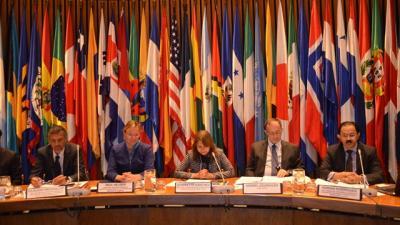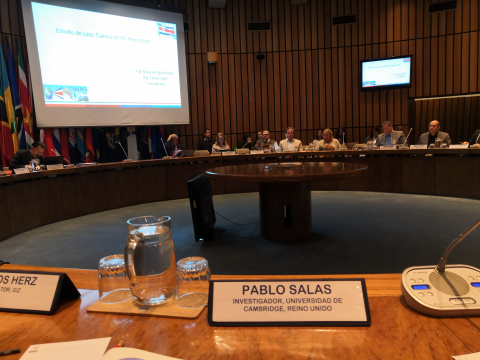Bridge to Impact (B2I) – Accelerating Impact of the ESRC Project BRIDGE
Bridge to Impact (B2I) is a project designed to maximise the impact of the social science research developed under the project BRIDGE: Building Resilience In a Dynamic Global Economy - Complexity Across Scales in Brazil. The project has been funded by the Impact Acceleration Account (IAA) of the Economic and Social Research Council (ESRC). The team includes:
- PI : Dr Pablo Salas
- Co-I : Prof Jorge Viñuales
- Co-I : Prof Baltazar Guerra
Public Engagement
Public engagement in the BRIDGE project has been developed through an extensive network of stakeholders, which includes policy makers, private and third sector organisations. Based on the positive feedback obtained from the attendees to our previous engagement activities developed in BRIDGE, project B2I was designed to maximise its impact through the implementation of tailored activities for the BRIDGE network of stakeholders. Here we present a summary of the main events organised through B2I in UK, Brazil and Chile.
Engagement Events in UK
Energy-Water-Food Nexus Workshop at Newnham College, Cambridge, UK
The first B2I activity was a Nexus Workshop at Newnham College on the 26th of June of 2018. This event included the participation of all the Universities that are part of the BRIDGE project, including University of Cambridge, Radboud University, Open University and UNISUL. The event also included the participation of international guests, including:
- Dr Luiz Alberto da Cunha Bustamante, Legislative Advisor to the Federal Senate in Brazil.
- Secretary Pedro Tiê Cândido Souza, Brazilian diplomat, Head of the Environment and Climate Change Section, Embassy of Brazil in London.
- Claudio Bacigalupi, Head of Sector Water at European Commission Directorate for Development Cooperation.
- Benny Dembitzer, Cambridge Alumni and Economists, Managing Director of Grassroots Africa and member of the team awarded the 1985 Nobel Peace Prize on behalf of IPPNW (International Physicians for the Prevention of Nuclear Weapons).
This event was co-funded by the ‘Good’ Energy Policy - Small Grants Scheme. In that context, we took the opportunity to invite other groups from the University of Cambridge, to present their work in areas connected with the Nexus and look for potential partnerships:
- Prof Howard Griffiths, Co-Chair of the Cambridge University Strategic Initiative in Global Food Security.
- Dr Gemma Cranston and Eliot Whittington, from the Cambridge Institute for Sustainability Leadership (CISL), to present ‘The Nexus Network’.
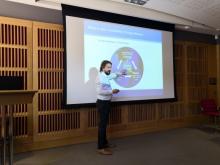
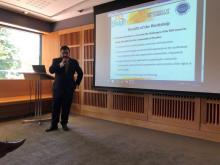
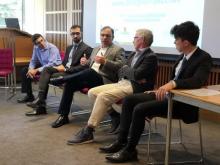
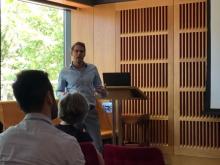
Nexus Seminar with UNISUL team and Benny Dembitzer
Taking advantage of an academic visit of the UNISUL team to Europe, we organised a special event on the 6th of December 2018. We invited Benny Dembitzer to present his new book: ‘The famine next door. Africa is burning. The north is watching’. The event included a series of seminars from the UNISUL team, presenting the work they have been doing on the Nexus in Brazil.
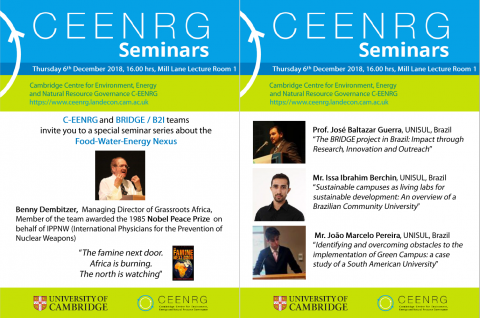
Engagement Events in Brazil
The main objective of the BRIDGE project is to ‘develop a framework of analysis and policy engagement to effectively inform and support the policy cycle in Brazil to reach objectives of sustainable development’ (BRIDGE proposal, 2015). Policy engagement in BRIDGE is being developed through an extensive network of stakeholders, which includes policy makers, private and third sector organisations in Brazil. In that context, B2I has been designed to maximise the impact of the BRIDGE network of stakeholders. Taking advantage of the annual visit of the BRIDGE team to Brazil, in September 2018, we organised a series of high impact events in Santa Catarina, including the cities of Florianopolis, Tubarão and Predra Branca. The events included stakeholder sessions with people from industry, policy makers, researchers and nexus courses for Brazilian students. A summary of these events is presented below.
Inauguration of the BRIDGE Pilot Project: Solar Hydroponic Greenhouse
On the 27th of September 2018, in the city of Tubarão, we had the inauguration of the Solar Hydroponic Greenhouse, one of the BRIDGE Pilot Projects. The event was attended by approximately 30 people, including the President of the Santa Catarina State Research and Innovation Funding Agency (FAPESC), Tubarão City Counselors, BRIDGE researchers, UNISUL students and general public.
A very special guest in the event was a group of students from the local primary school ‘Coração Feliz’ (it translates as ‘Happy Heart School’). The students from the primary school are working in a miniature representation of the UNISUL’s solar greenhouse, for a robotic competition, to produce vegetables in outer space (thinking on a future colonisation or Mars). The interaction between BRIDGE researchers and the local school is part of the continuous engagement process fostered by BRIDGE.
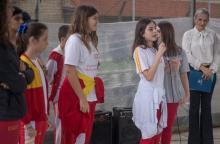
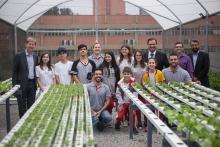
Among the attendees, were the President of FAPESC, Prof. Guilberto Agnolin, and the Director of Administration of FAPESC, Dr Walter Gomes. FAPSEC is the Foundation for Research and Innovation Support of the State of Santa Catarina, the funding body supporting the BRIDGE project under the Newton Fund.
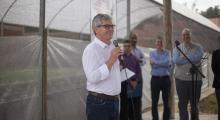
Below, we can see some articles in the local press regarding the solar greenhouse:
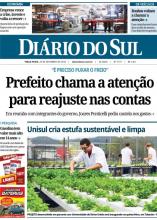
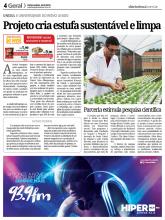
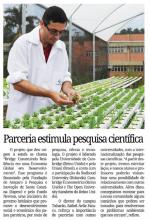
The hydroponic solar greenhouse was developed as an alternative food production method, using only 10% of the water used by traditional methods, and renewable energy from solar panels. The food produced by the greenhouse is partly sold at the UNISUL campus in Tubarão, and partly donated to local schools and charities. The solar greenhouse is also used for research on how to improve food production efficiency, strengthening food security.
Following the success of this pilot project, C-EENRG, UNISUL and UFSC applied for funding at the Research England GCRF QR Funding 2018-19 University of Cambridge call. They received funding for building a new solar hydroponic greenhouse to install it in a vulnerable community of Santa Catarina. The project, called ‘BRIDGE-TESC - Technological Empowerment for family-farming agriculture in Santa Catarina’, will monitor the production of food in the greenhouse, using cutting-edge ‘Internet of Things’ (IoT) technology. Moreover, the engineering departments of UNISUL and UFSC will develop a new programme for their engineering students, so they can develop low-cost technological solutions for agriculture in Santa Catarina, using the infrastructure deployed in BRIDGE-TESC.
Case Study on Policy Engagement: Florianopolis City Councelor Maikon Costa
A crucial aspect of the BRIDGE project is the work we do on policy engagement, especially at the local level in Santa Catarina. Professor Baltazar Guerra, the BRIDGE PI in Brazil, has been working with local policy makers for more than a decade, addressing sustainability issues at the city, state and federal levels.
A particularly successful collaboration has been taking place with Florianopolis City Councelor Maikon Costa. Maikon has supported the organisation and delivery of BRIDGE project activities in Florianopolis, including the international workshop of 2017, where the Nexus challenges of Brazil were discussed in detail.
In September 2018, Dr Pablo Salas and Prof. Baltazar Guerra interviewed Maikon Costa, to know more about his work on sustainability, his connection with the BRIDGE project and the influence of BRIDGE on his 'Urban Farming' bill proposal at the Florianopolis City Council. The interview can be found in the following link.
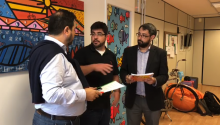
Business Association of Tubarão - ACIT
Private sector engagement is crucial for the creation for awareness, and to foster changes of attitude and behaviour from companies. Working in this direction, on the 20th of September 2018, we organised a special stakeholder engagement session for ACIT, the Business Association of Tubarão (Associação Empresarial de Tubarão/SC. https://www.acittubarao.com.br). ACIT ‘represents businesses in the industrial, commercial and service sectors’ in Santa Catarina. The session was opened by the Mayor of Tubarão, Mr. Joares Carlos Ponticelli, and the President of ACIT, Mr. Edson Martins Antônio. The event included the participation of several companies from the region, especially from the energy and mining sectors.
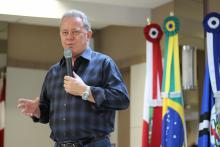
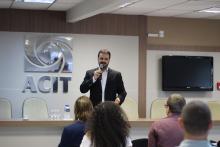
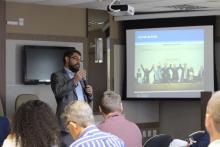
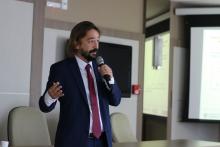
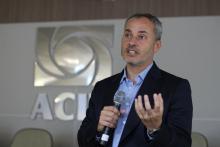
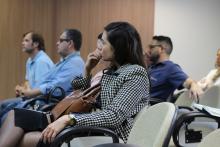
Florianopolis City Council
Building on the engagement events organised in 2017, our team organised a follow-up session at the Florianopolis City Council on the 21st of September 2018. The session was presided by City Counsellor Guilherme Botelho, and had the participation of several council members as well as Dr Walter Gomes, Director of Administration of FAPESC.
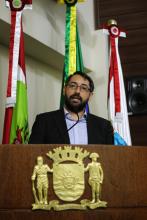
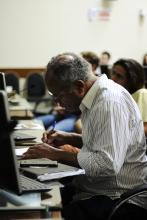
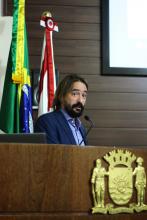
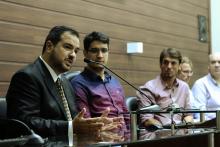
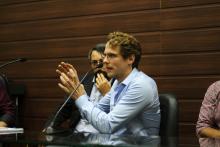
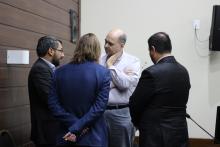
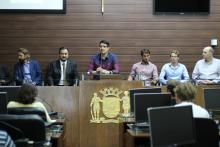
Nexus courses for UNISUL undergraduate and graduate students
B2I included the organisation of a series of short nexus courses, for students in the following programmes:
- Undergraduate Programme on Management and International Relations, UNISUL.
- Graduate Programme on Management and Environmental Sciences, UNISUL.
- Undergraduate Programme on Regional Development of the State of Santa Catarina
The courses included an introduction to climate change, and its impact on the energy-water-food nexus. The topics were addressed first from a global perspective, and later a more detailed view of the specific challenges in Brazil were analysed.
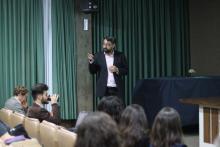
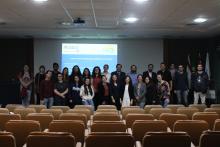
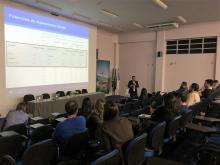
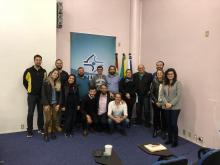
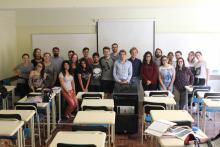
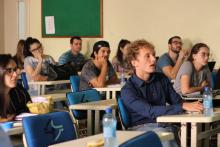
Interviews in Local Television
The BRIDGE team took the opportunity to talk to the local press, regarding global sustainability issues and to describe the work we have been doing in Brazil. One interview took place in the programme ‘Education and Citizenship’ at RecordNews. The other interview was recorded for the programme ‘Big Issues’ at UNISUL TV, a local TV station run by the press department of UNISUL.
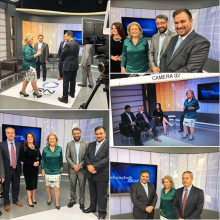
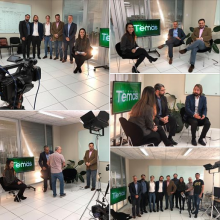
Tubarão City Council
On the 27th of September 2018, the same day we inaugurated the solar hydroponic greenhouse, we organised a meeting with representatives of the Tubarão City Council. The goal of the meeting was to discuss with the City Council the work being developed under the BRIDGE project. In particular, our conversation focused on the work done in the design and development of a solar hydroponic greenhouse in the city of Tubarão, and how we can work together with the City Council to maximise its impact in the local community.
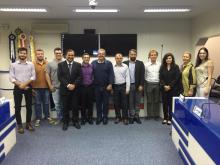
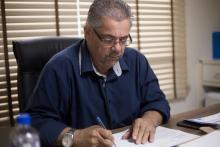
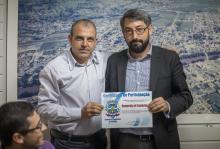
Conference
Our visit to Brazil was planned so we could participate in the conference ‘JUNIC 2018: UNISUL Journey of Scientific Initiation’ (JUNIC stands for 'Jornada UNisul de Iniciação Científica'). The JUNIC promotes integration and debates between different research groups of UNISUL, and its main topic this year was research internationalisation. The event had more than 300 attendees, from all the different research groups of UNISUL. It included presentations from FAPESC and CAPES, the Brazilian federal government agency responsible for quality assurance in undergraduate and postgraduate institutions in Brazil.
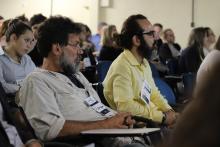
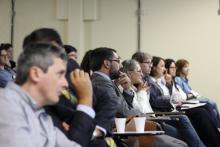
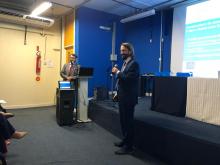
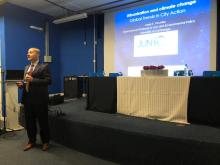
Engagement Events in Chile
Workshop with policy makers and academics, Santiago, Chile
On the 9th of May 2018, Pablo Salas and Hector Pollitt led the Workshop on Climate Policy Analysis for Chile. This workshop was organised in the context of the 'Global Carbon Market' and the 'Partnership for Market Readiness' projects of the Chilean Ministry of Energy and the German Corporation for International Cooperation (GIZ - Deutsche Gesellschaft für Internationale Zusammenarbeit). The workshop gathered experts from both the public and private sectors to discuss the creation of a new modelling and simulation tool to assess potential future climate policy. Additional to the workshop, GIZ and the Ministry supported the organisation of a series of interviews with key policy-makers from different governmental departments connected with climate policy. Based on the results of the workshop and the interviews, Cambridge Econometrics provided the basis for the design of a new modelling and simulation tool to assess potential future climate policy in Chile, whilst Pablo Salas provided insights about the Chilean legal, economic and social contexts.
Based on the results of this collaboration, the Chilean Government produced the Terms of Reference for the implementation of a new modelling and simulation tool to assess potential future climate policy in Chile.
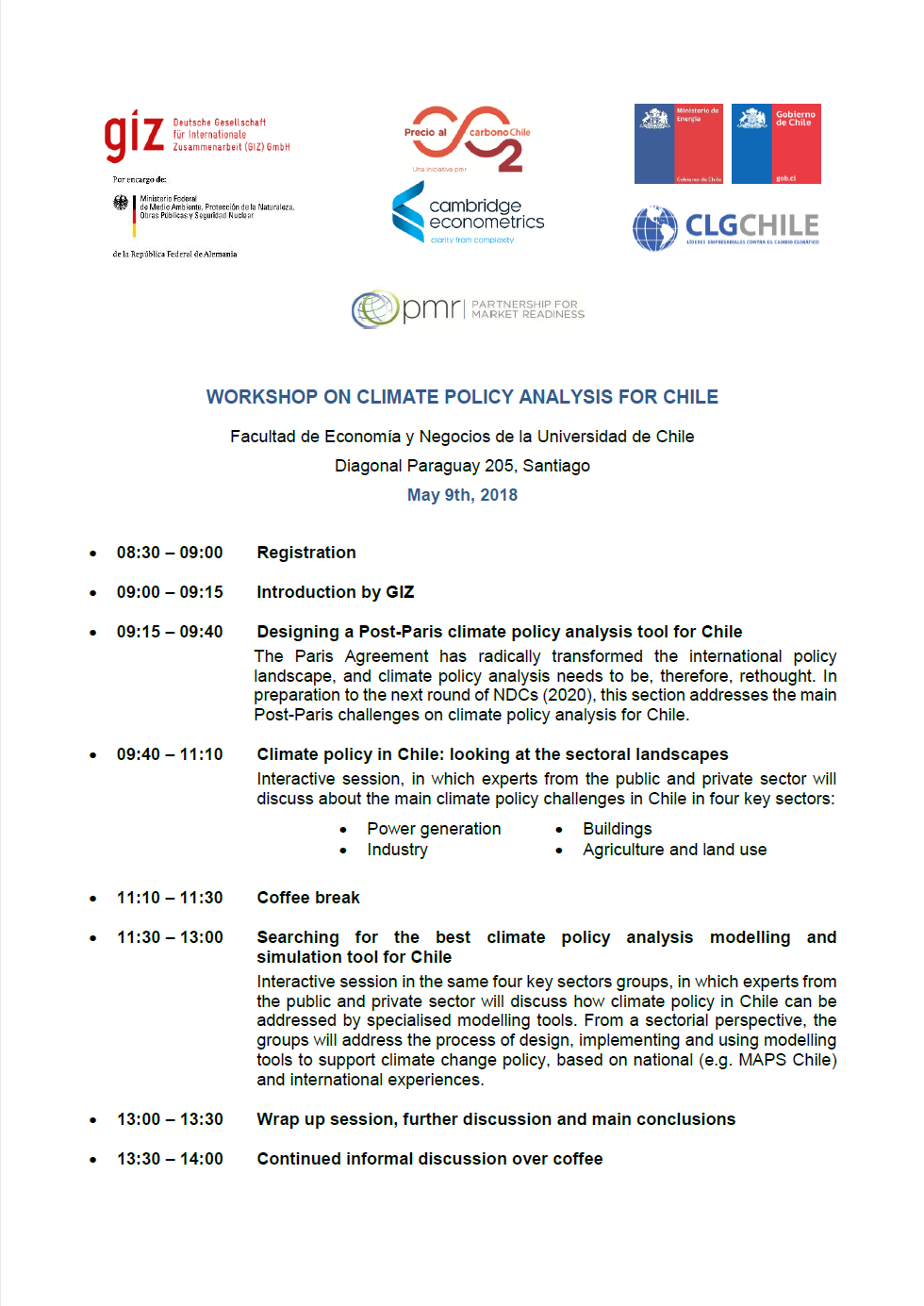
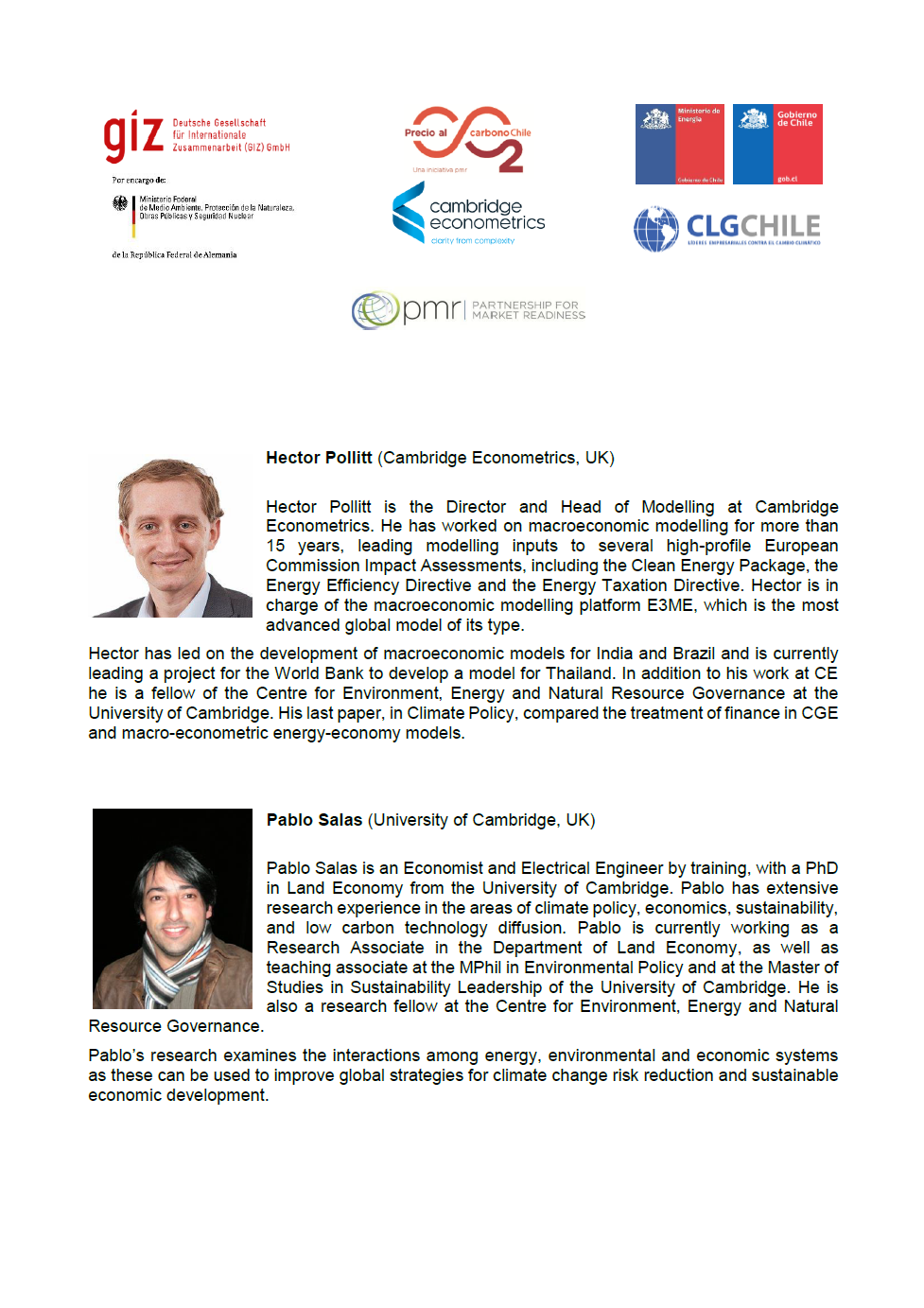
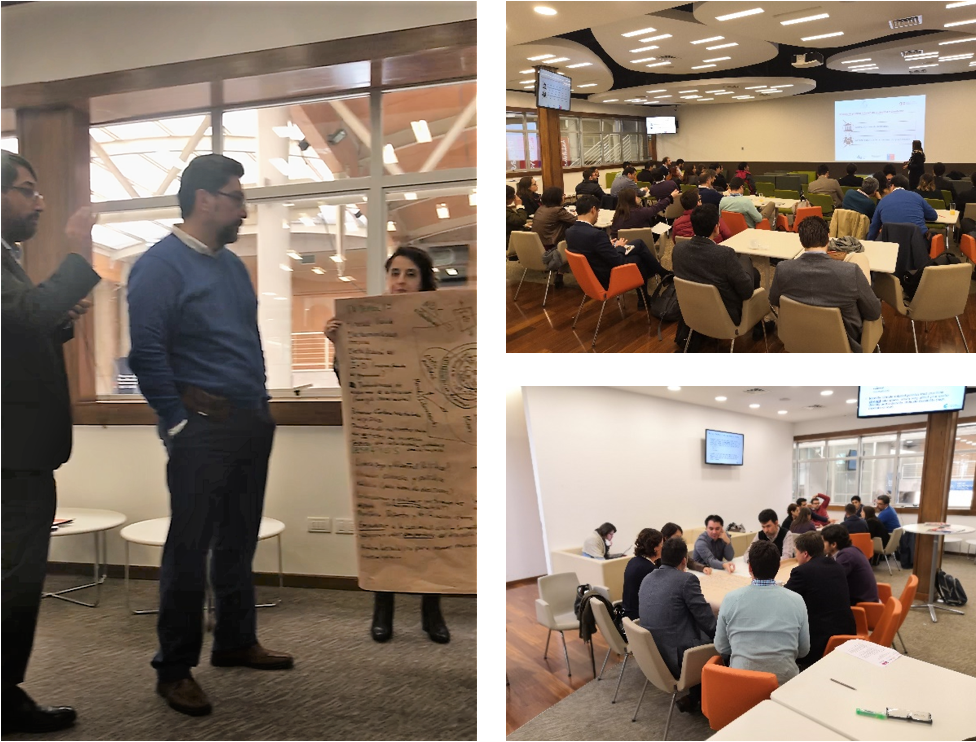
Regional Political-Technical Dialogue on Energy, Water and Food Nexus, ECLAC, Santiago, Chile
On the 14th of May 2018, Pablo Salas presented the BRIDGE project at the 'Regional Political-Technical Dialogue on Energy, Water and Food Nexus'. This event was organised by the UN Economic Commission for Latin America and the Caribbean (ECLAC), and it was held at the ECLAC headquarters in Santiago, Chile. The conference was focused on the connections between the energy-water-food nexus, the Sustainable Development Goals (SDG) and the challenges associated to implement nexus policies in Latin America. The trip to Chile was kindly co-funded by the 'Good' Energy Policy - Small Grants Scheme.
